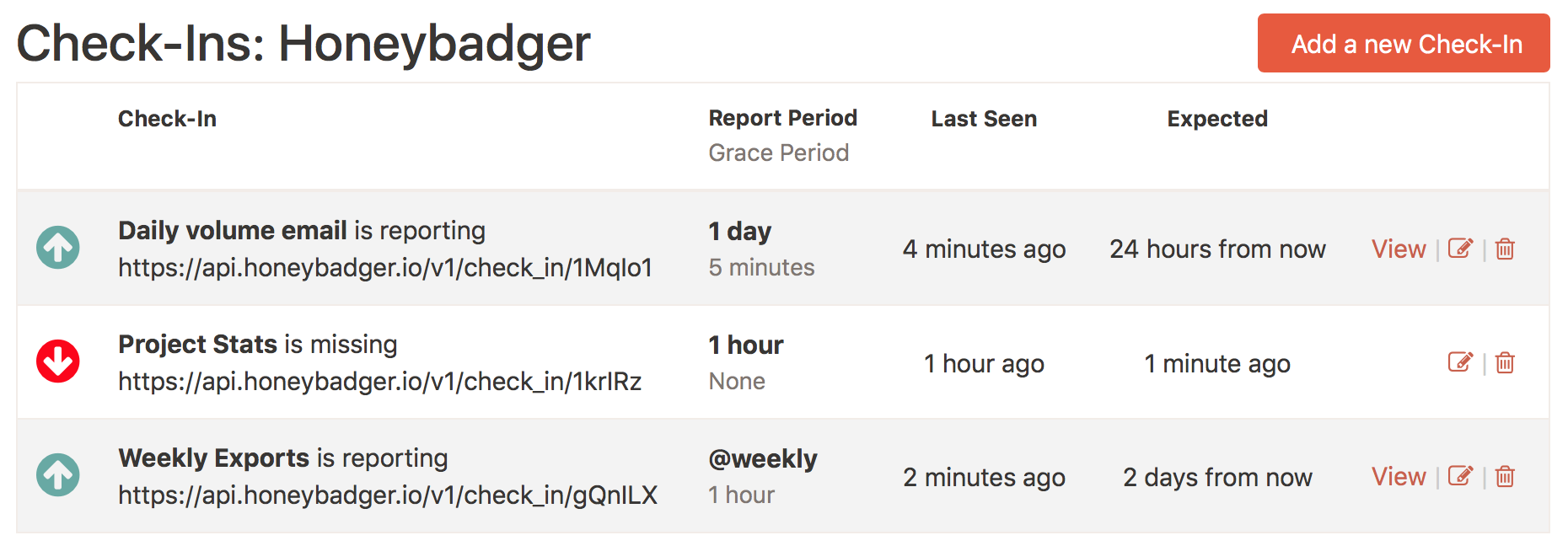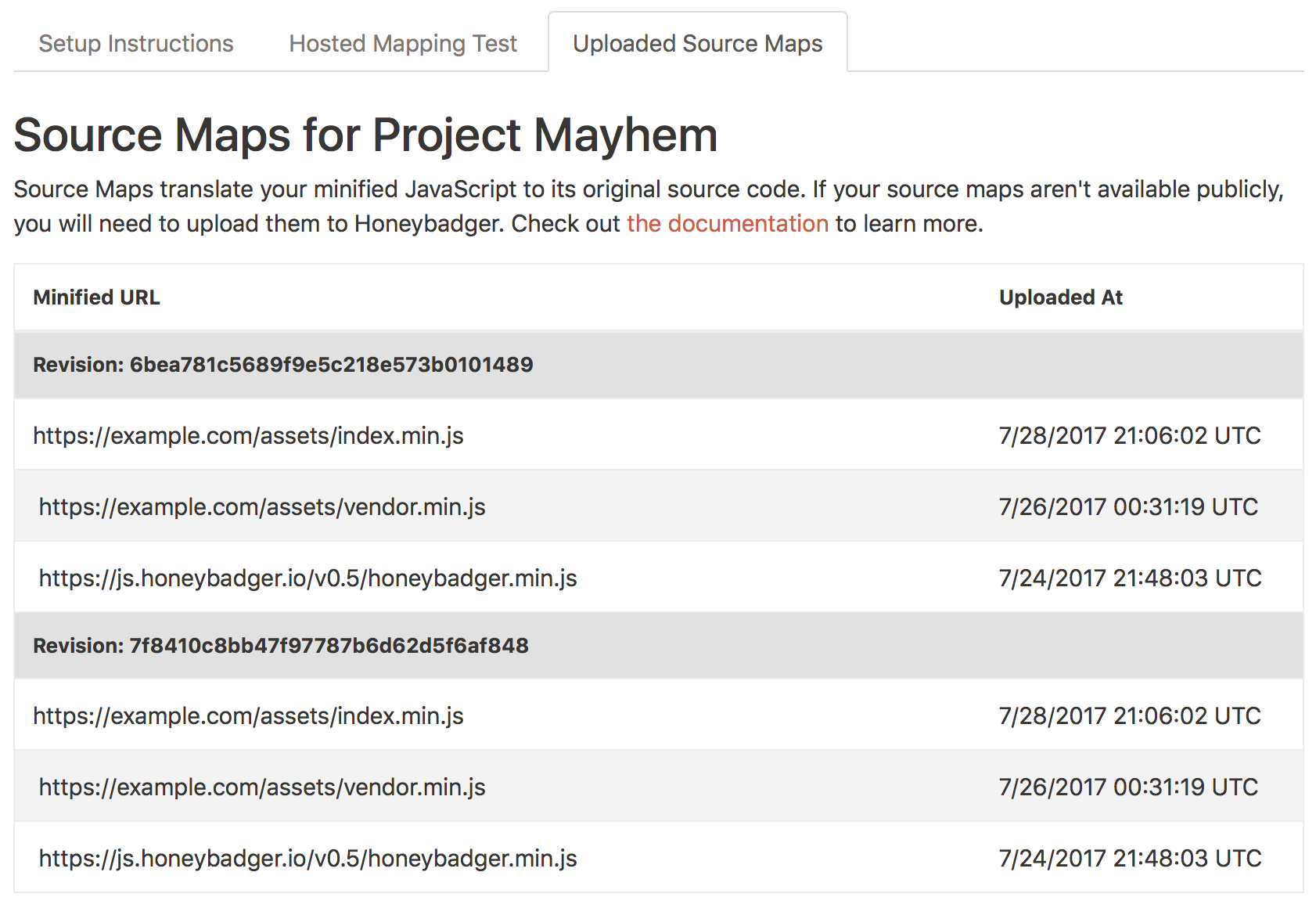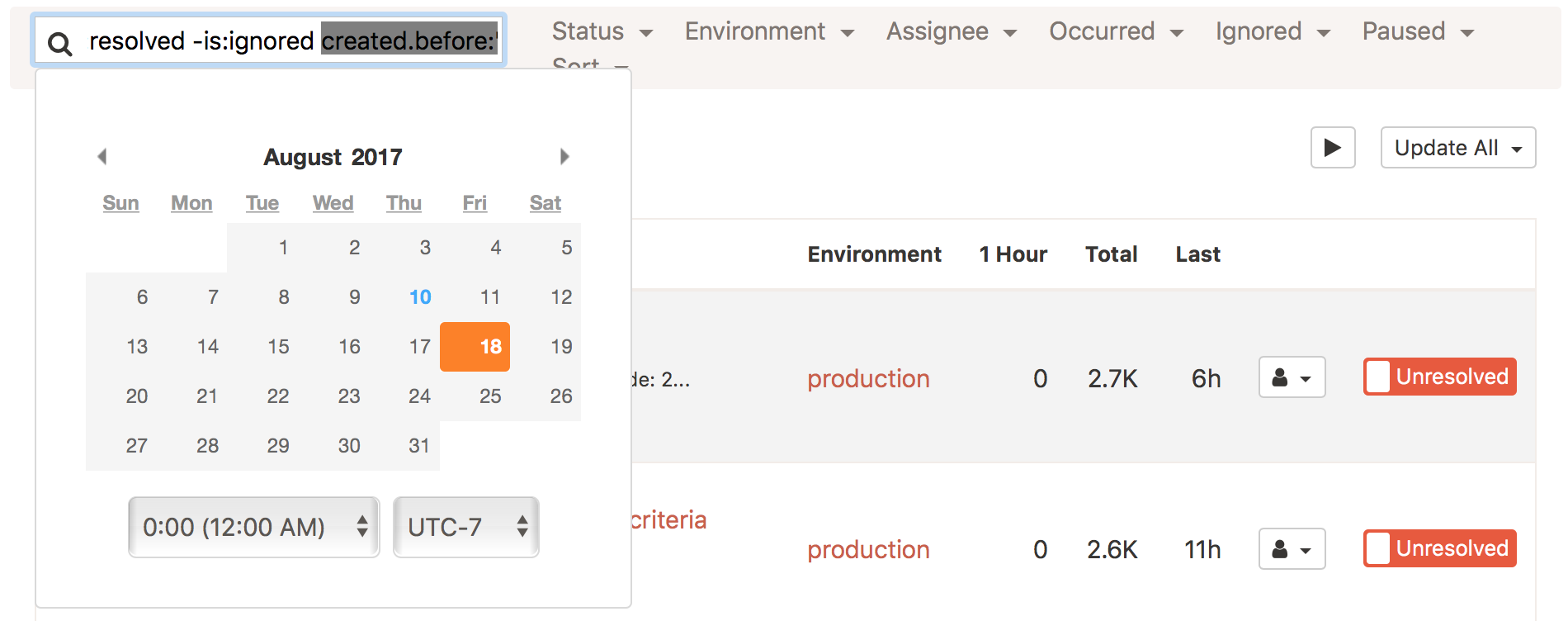As a lean bootstrapped startup, there's always a lot to do at Honeybadger, in addition to shipping features. "Business things" constantly plot to distract us from our first love: shipping new features.
Luckily for our customers, we're developers: we're great at procrastinating on the boring business stuff so that we can code all day. :)
The year is not over yet (so expect this post to get an update from time to time!), but we wanted to share some of the features we've shipped this year.
The list is in reverse-chronological order, so you can see what we've been up to most recently and read on to learn about all the other cool things we've done this year.
Ship it! :shipit:
August 2017: Check-Ins!
In August, we released a brand new monitoring feature called Check-Ins. Check-Ins allows you to monitor jobs and services by pinging a Honeybadger URL periodically. If you ever stop "checking in", Honeybadger will alert you.
You can use Check-Ins to keep an eye on your cron jobs, scheduled tasks, or anything that you want to ensure is running properly:

Read the blog post and check out the docs to learn more.
July 2017: Source Map Uploads
Honeybadger has supported source maps for several years now, but admitedly not very well. We had some limitations: you had to make your source maps public for us to be able to download them, and we didn’t use the source map when grouping errors.
In July we shipped the next version of our source maps feature which solves both of those issues (and more)!

Check out the blog post and the docs.
June 2017: Search Improvements
In June we released the foundation for a new search UI which will allow us to expose our powerful search syntax in an intuitive graphical interface. The first feature we built into the new UI is a date picker, which you can read about on the blog:

We’re currently testing a bunch of similar new UI additions which should be released later this year.
May 2017: Unsubscribe from Specific Notifications
May was a busy travel month for us, but we still managed to get two new features out the door:
You can now unsubscribe from notifications for individual errors. When you use the Unsubscribe button on the error detail page or reply to a notification email with @unsubscribe, you will no longer receive notifications about that error via email or SMS.

We also updated the The Asana integration to use OAuth for authentication instead of API keys. You can update your integrations by editing the integration and clicking the "Save and Authenticate" button. You can also connect your Asana account to your Honeybadger account (to create tasks manually from the Honeybadger UI) by visiting https://app.honeybadger.io/users/edit#authentication and clicking the "Connect Asana" button.
April 2017: Uptime 2.0
Uptime monitoring got an upgrade in April, with a bunch of new options for monitoring HTTP endpoints. You can now do the following for your checks:
- Specify custom request headers
- Specify a request body
- Choose the request method (GET, PUT, POST, PATCH, DELETE)
- Choose the test frequency (1, 5, 15 minute intervals)
- Choose the test locations
- Choose whether to trigger an outage for an expired, invalid, or self-signed SSL certificate

We also added a report of the uptime percentage by month when viewing the details for a site.
Oh, and one other thing: we made comments editable!
March 2017: Error Tracking Improvements
In March we made various improvements to error tracking, including:
- The sort order is now displayed more prominently in the error index page
- We added callouts on the error details page to let you know when you're viewing the first or most-recent error occurrence
- We released v3.1.0 of the Ruby gem as a followup to the 3.0.0 release
- We added a quick way to copy the params and other data to the clipboard on the error detail page
February 2017: Ruby Gem 3.0 and more
In February we released version 3.0.0 of our Ruby gem. The new version brought a lot of improvements:
- “Plain Ruby Mode”, which allows the Honeybadger client to be used without any of our optional integrations (for those of us who dislike magic)
- Support for reporting to multiple Honeybadger projects in the same app
- We brought back
Honeybadger.configureto optionally configure the gem from Ruby - Cron and bash error reporting using
honeybadger exec - Command-line error reporting using
honeybadger notify
To learn more about the new gem, read the blog post and check out a full list of changes in the CHANGELOG.
We also added a new integration with Clubhouse. Clubhouse users can now create a new story from an error in Honeybadger. We can also automaticaly create stories when an error occurs and mark them as fixed when the error is resolved.
Finally, you can now filter out errors that have been paused from your search results using -is:paused in your search string. You can also find only the errors that have been paused by using is:paused.
January 2017: Platform Improvements
The end of 2016 was hectic for us, with RubyConf capping our conference travel followed immediately by the holidays. January was a month to decompress, and to work on a bunch of improvements to the Honeybadger platform:
- We moved more of our infrastructure to AWS
- Added a new authentication option for Uptime monitoring and WebHooks
- Beta tested a new major version of our Ruby gem
- Fixed some bugs in the Rails app


